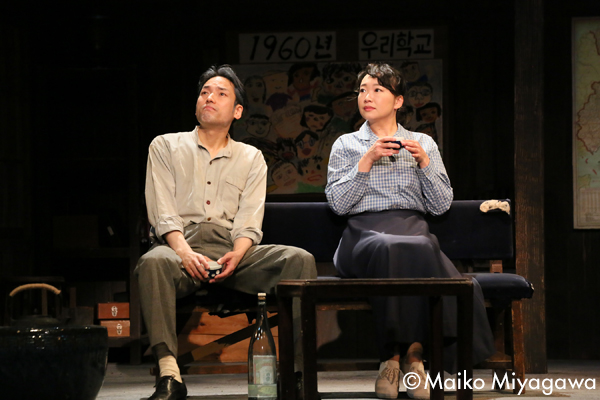
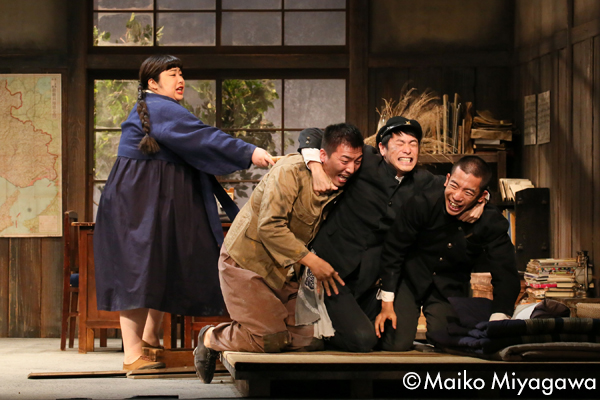
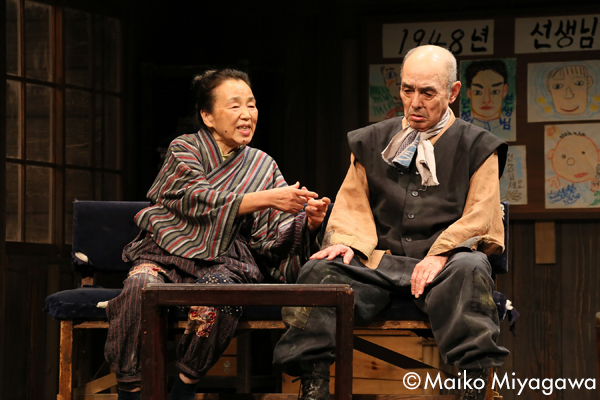
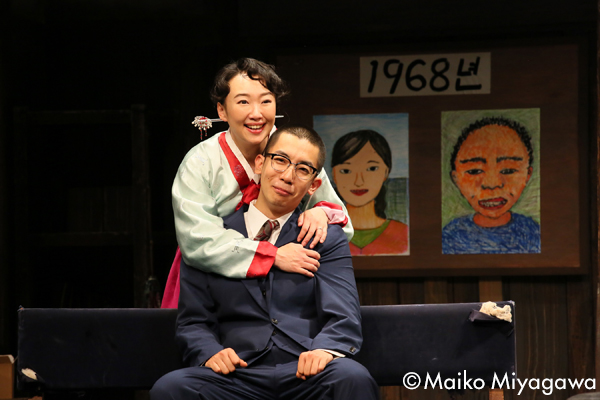
Bungakuza Theatre Company Fifty-four Eyes
(Nov. 6 – 15, 2020 at Kinokuniya Southern Theatre Takashimaya)
Photos: Maiko Miyagawa
Data
:
Premiere: 2020
Fifty-Four Eyes
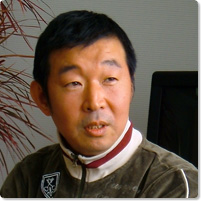
Born in 1957 in Himeji city, Hyogo Prefecture, Chong is a writer and director. Quitting the Literature Dept. of Doshisha Univ., he studied in the Art Dept. of the Yokohama School of Broadcasting and Cinema (present Japan Academy of Moving Images). After working as an art assistant at the Shochiku film studios, he joined the Black Tent Theater company.
The Shinjuku Ryozanpaku Theater company was created together with members of his own generation. Today he is active as a freelance writer and director. While writing plays for Bungakuza, Opera Theater Konyakuza and other theaters, he founded the production group “Umi no Circus” in 1992 and served as writer and director, presenting sadly comical plays about the subtleties of life. In 1993, he won the 38th Kishida Drama Award for The Terayama. He also became active as a film scriptwriter, winning the Asahi Film Contest Screenplay Award and the Kinema Junpo Film Award for the screenplay Tsuki wa Docchi ni Deteiru along with other awards. In 1998, he won numerous awards for Ai wo Kou Hito, including the main prize of the Kinema Junpo Film Awards, the Japan Academy Award for Best Screenplay, the 1st Kikushima Ryuzo Award and the Asia Pacific Film Festival Best Screenplay Award. He enjoys popularity writing scripts for TV and radio, having won the Grand Prize of the 2001 Geijutsu Festival for Boku wa Ashita 18 ni Naru (2001/NHK television). In 2008 his play Yakiniku Dragon was produced by the New National Theatre, Tokyo as a joint Japan-South Korea production, presented again in 2011 and 2016, and was also restaged in Seoul, ROK in 2008 and 2011. This play won him the 16th Yomiuri Theater Grand Prix award for Best Director, the 12th Tsuruya Namboku Drama Award, the 43rd Kinokuniya Theater Award and the 59th Geijutsu Sensho Minister of Education, Culture, Sports, Science and Technology Award. In spring of 2014 he was awarded Japan’s Medal of Honor with Purple Ribbon.
https://www.lespros.co.jp/artists/wishing-chong/




Bungakuza Theatre Company Fifty-four Eyes
(Nov. 6 – 15, 2020 at Kinokuniya Southern Theatre Takashimaya)
Photos: Maiko Miyagawa
Data
:
Premiere: 2020
Act 1
The play takes as its setting the teachers’ room of the Nishi-Jima Korean Primary School, a Korean school on the island Nishi-jima in the Seto Inland Sea. On this island where the main industry is production of crushed stone, Korean and Japanese had been living together here since before the War, and now there are 27 children studying at this school.
The year is 1948. The 14-year-olds Ryohei Yoshida, Hong Changsoo, Oh Manseok and the girl student Kim Gunja are childhood friends. Today, a new teacher is coming to the school, so the four have been summoned to the teachers’ room to clean up, but they are too busy playing around and the cleaning is hardly progressing at all.
It is then that the new teacher, Kang Chunhua (22) is brought in by teacher Yoo Inchoul (35). There is an air of intimacy between the two. To Chunhua, who is worried about how she will take to life on a remote island like this that still has no electricity or telephones, Incheol says, “We can be happy that at least there are no food shortages here.” Although two and a half years have passed since the end of the War, the supply of food around most of Japan is still in a dire state.
Ryohei and Changsoo are both single children of single parent families. Ryohei gets good grades at school, but since his mother, Mitsuko, is struggling to get by selling fish at a black market in Himeji, he intends to go to work in the stone crushing yard to earn money for the family as soon as he graduates from middle school. As for Changsoo, he hopes to go to one of the big cities to make a name for himself, but his father, Wonsu, the head of a hanba (a lodging for workers) is opposed to his son’s plans, and the two are constantly arguing as a result.
While picking at their plates of Wonsu’s usual stewed octopus, they are gossiping about the recent order for the Korean school to be closed. Incheol complains angrily that forcing Japan-resident Koreans to go to a Japanese school is a complete denial of the ethnic education they deserve. He says, “This primary school was built by your [Korean] fathers and mothers and the island’s young people. If the time comes when you are able to return to our native land (Korea), I want you to be able to greet your grandfather and grandmother in Korean properly … This school is full of memories of our homeland.”
The date is April 25th. The GHQ of the Allied Occupation government has announced the closing of all Korean schools in Japan, which is met by large-scale protests by the resident Korean communities in Osaka and Kobe. Ryohei, Changsoo and Manseok sneak off the island without their parents’ or teachers’ knowledge to take part in the protest demonstrations.
In the teachers’ room, Incheol is complaining about the bad relationship between himself and his wife, while Chunhua laments that she has been a fool to let herself be talked into coming to this godforsaken island by this worthless man.
The date is May 1st. Bearing cuts and bruises from the violence of the protests, the three youths return to the island. Changsoo has a badly injured foot that may leave him crippled, Manseok is in tears as he says that he was unable to do anything when his two friends were being beaten. Chunhua hugs Manseok and tells him that he is a brave defender of his people.
The year is 1952. As one school after another is closing since the issuance of the order to close all Korean schools in Japan, the Nishi-Jima Korean Primary School remains open and holding classes as usual. Now 19, Ryohei and Changsoo are helping out in their respective parent’s businesses and Gunja is working in a diner in Himeji. Now working in the stone crushing yard, Manseok has been inspired by his trauma from not being able to protect his friends that time in the demonstrations to become an activist working for worker rights.
As Incheol complains about his wife for threatening to commit suicide because of him, Chunhua sarcastically tells him that it is only words and that his wife will never actually do it.
Act 2
The year is 1953. More fanatic in his activism than ever, Manseok has decided that he is going to take part in the Korean War as a member of the volunteer army, but Changsoo argues against it, saying that neither North or South Korea will help the Japan resident Koreans like themselves. Ryohei also tries to dissuade Manseok from going because of the danger, but Manseok won’t listen.
The year is 1954. Now 21, Ryohei has asked his long-admired teacher, Chunhua, to marry him, but Chunhua gently dodges the proposal. Having returned from his wife’s funeral in Himeji, Incheol is now telling Chunhua that he doesn’t know how he can go on now that he realizes the wife who had been a thorn in his side for so long is gone forever.
The year is 1960. Ryohei has given Chunhua an engagement ring, but his mother Mitsuko’s refusal to accept the marriage has put the brakes on the relationship. Incheol has announced that he is going to answer the repatriation call and move to North Korea, and now people from around the island are coming to bid him farewell.
It is now 1961. As a result of modernization at the crushed rock yard, they are now using dynamite to blast our fresh rock, and in an accident Ryohei gets caught beneath some blasted rock. Chunhua rushes Ryohei’s traumatized mother Mitsuko to the hospital and then waits alone in the waiting room. As she waits, she moves his engagement ring to the ring finger of her left hand.
The year is now 1968. With many issues still unsolved the Treaty on Basic Relations between Japan and the Republic of Korea has been signed, bringing with it a big change in the times. Seven years have passed since Ryohei’s death. The crushed stone yard has been shut down, electricity has finally been brought to the island by underwater cable, and with only two students now in the Nishi-Jima Korean Primary School, its closing the coming spring has been decided.
This is the day of the joint Culture Day festival with the island’s Seiban Primary School. Wearing her traditional Korean chi’ma chogori costume, Chunhua is running the ceremonies, and it is there she meets the new teacher who will take a position at the Seiban Primary School. It turns out to be her former student Changsoo, who is now married to his former classmate and childhood friend, Gunja, who now carries his child in her womb. As Changsoo regrets that he is the only survivor of his three young friends, Chunhua embraces his, saying, “You have survived and become a seonsaengnim (Korean for teacher). You have married and will have a child, what is there to regret about?”
A boat carrying the school children arrives at the boat landing. Chunhua says in the island accent, “Those 54 young students’ eyes I first knew are now just four, but I will keep up the good work ….” To her side comes Ryohei, and together they wave goodbye with arms high in the air.
Related Tags